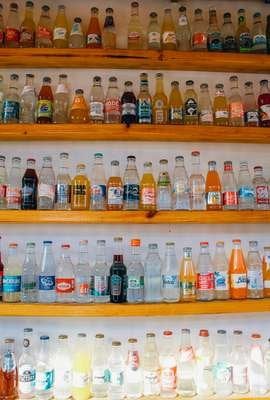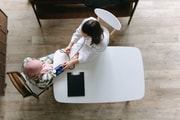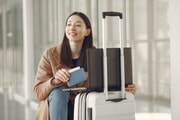Say Goodbye to Constant Bathroom Breaks – Find Out What Drinks Are Really to Blame!
By
Danielle F.
- Replies 4
As we age, our bodies go through a myriad of changes; one of the more inconvenient ones might be the increased frequency of bathroom breaks. It's a topic we might chuckle about with friends or grumble over when it disrupts a good night's sleep, but have you ever wondered if what you're sipping throughout the day is the culprit? Well, recent experiments have shed light on which beverages are most likely to have you mapping out the nearest restrooms.
Firstly, it's normal to visit the loo four to eight times a day, including once or twice at night. But if you're finding your bathroom visits more frequent than a politician's promises during an election campaign, it's time to look at your drink choices.
Dr Justin Houman, a urologist and professor at Cedars-Sinai Medical Centre in Los Angeles, has ranked the drinks that are most likely to send you scurrying to the smallest room in the house. Topping the list is alcohol, and it's not just because of the merry toasts at family gatherings. Alcohol acts as a diuretic, which means it tells your kidneys to produce more urine. It suppresses the antidiuretic hormone (ADH), which is usually in charge of telling your kidneys to reabsorb water. This leads to increased urine production and, consequently, more frequent trips to the bathroom.
But it's not just the quantity of alcohol that matters; the type does too. Beverages with higher alcohol content, like wine and spirits, are more diuretic than their lower-alcohol cousin, beer. So, if you're enjoying a glass of shiraz or a nip of whiskey, you might want to keep an eye on how often you're refilling your glass—and your bladder.
Next on Dr Houman's list are caffeinated drinks, with energy drinks like Monster and Red Bull leading the pack. These beverages can contain up to twice the caffeine of a cup of coffee, and it's not just the caffeine that's the issue. Energy drinks often include other stimulants like guarana and taurine, which can also suppress ADH and irritate the bladder, leading to that all-too-familiar urgent need to pee.
Coffee and tea are also on the list, though they contain less caffeine than energy drinks. They still have diuretic properties and can irritate the bladder lining, increasing the urgency to go. For those who love their cuppa but not the consequences, switching to decaf or herbal varieties might be the answer, as they have minimal impact on bladder function.
Carbonated sodas are another bladder botherer, thanks to their acidity and additives like sugar and artificial sweeteners. Even plain seltzers can cause irritation, though to a lesser extent due to the absence of caffeine and sweeteners.
Fruit juices, particularly those from citrus fruits, are highly acidic and can irritate the bladder as well. Smoothies made with high-acid fruits like citrus, grapes, berries, and pineapple can have similar effects. However, smoothies made with low-acid fruits like bananas, melons, and apples are less likely to cause issues and are more hydrating.
So, what's the takeaway for those of us who'd rather not plan our days around bathroom breaks? Moderation is key. Enjoy your favourite drinks, but be mindful of their potential effects on your bladder. Opt for low-acid fruit juices and smoothies, and consider switching to decaf coffee or tea if you're sensitive to caffeine.
Remember, everyone's body is different, and what irritates one person's bladder may not affect another's. It's all about finding the right balance for you. And if you're experiencing significant changes in your bathroom habits, it's always a good idea to consult with a healthcare professional.

We'd love to hear from you, our wise and experienced readers. Have you noticed certain drinks affecting your bathroom routine? Share your stories and tips in the comments below, and let's help each other enjoy our golden years with fewer interruptions!
Firstly, it's normal to visit the loo four to eight times a day, including once or twice at night. But if you're finding your bathroom visits more frequent than a politician's promises during an election campaign, it's time to look at your drink choices.
Dr Justin Houman, a urologist and professor at Cedars-Sinai Medical Centre in Los Angeles, has ranked the drinks that are most likely to send you scurrying to the smallest room in the house. Topping the list is alcohol, and it's not just because of the merry toasts at family gatherings. Alcohol acts as a diuretic, which means it tells your kidneys to produce more urine. It suppresses the antidiuretic hormone (ADH), which is usually in charge of telling your kidneys to reabsorb water. This leads to increased urine production and, consequently, more frequent trips to the bathroom.
But it's not just the quantity of alcohol that matters; the type does too. Beverages with higher alcohol content, like wine and spirits, are more diuretic than their lower-alcohol cousin, beer. So, if you're enjoying a glass of shiraz or a nip of whiskey, you might want to keep an eye on how often you're refilling your glass—and your bladder.
Next on Dr Houman's list are caffeinated drinks, with energy drinks like Monster and Red Bull leading the pack. These beverages can contain up to twice the caffeine of a cup of coffee, and it's not just the caffeine that's the issue. Energy drinks often include other stimulants like guarana and taurine, which can also suppress ADH and irritate the bladder, leading to that all-too-familiar urgent need to pee.
Coffee and tea are also on the list, though they contain less caffeine than energy drinks. They still have diuretic properties and can irritate the bladder lining, increasing the urgency to go. For those who love their cuppa but not the consequences, switching to decaf or herbal varieties might be the answer, as they have minimal impact on bladder function.
Carbonated sodas are another bladder botherer, thanks to their acidity and additives like sugar and artificial sweeteners. Even plain seltzers can cause irritation, though to a lesser extent due to the absence of caffeine and sweeteners.
Fruit juices, particularly those from citrus fruits, are highly acidic and can irritate the bladder as well. Smoothies made with high-acid fruits like citrus, grapes, berries, and pineapple can have similar effects. However, smoothies made with low-acid fruits like bananas, melons, and apples are less likely to cause issues and are more hydrating.
So, what's the takeaway for those of us who'd rather not plan our days around bathroom breaks? Moderation is key. Enjoy your favourite drinks, but be mindful of their potential effects on your bladder. Opt for low-acid fruit juices and smoothies, and consider switching to decaf coffee or tea if you're sensitive to caffeine.
Remember, everyone's body is different, and what irritates one person's bladder may not affect another's. It's all about finding the right balance for you. And if you're experiencing significant changes in your bathroom habits, it's always a good idea to consult with a healthcare professional.
Key Takeaways
- Drinking alcohol is the most likely to increase the frequency of urination due to its diuretic properties and suppression of antidiuretic hormone (ADH).
- Energy drinks, which are high in caffeine and other stimulants, rank second in causing increased urine production and bladder irritation.
- Decaffeinated coffee and smoothies made with low-acidic fruits have a minimal impact on bladder function and are the least likely to induce frequent bathroom breaks.
- Frequent urination caused by certain drinks can lead to long-term issues such as incontinence and pelvic floor dysfunction.








